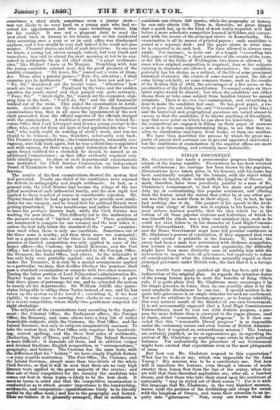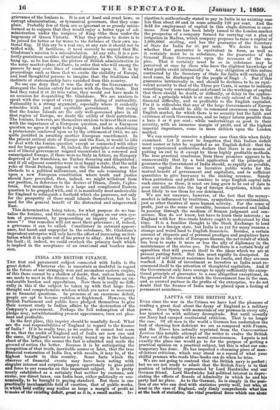IONIAN DISCONTENT.
GLIDSTOICE has made a pronconsular progress through the islands of the Ionian republic. Everywhere he has been received with enthusiasm ; his carriage has been drawn by the populace, illuminations have taken place in his honour, and his name has been continually coupled, by the Ionians with the object which they have at heart, their union with the kingdom of Greece. It must, therefore, have been peculiarly painful to a man of Mr. Gladstone's temperament, to find that his main and principal duty lay in contradicting this popular sentiment, and effacing from the Ionian mind the notion that either he or any other per- son was likely to assist them in their object. Yet, in fact, he has had nothing else to do. The purport of his speech to the Arch- bishop and clergy of Zante was to explain to his hearers, in the most urbane manner possible, that the idea which lay at the bottom of all those popular ovations and festivities, of which he was himself the object, was a false and mistaken idea such as lie could not even listen to in his character of Lord High-Commis- sioner Extraordinary. This was certainly an ungracious task ; and the Home Government must have felt peculiar confidence in Mr. Gladstone's powers of conciliation, if they supposed that even he could render it palatable to the Ionians. If, indeed, the envoy had been a man less penetrated with Hellenic sympathies, less certain to command esteem and popularity, the difficulty might have been more distinctly seen of sending him with the instruction to inquire into allgrievances, but expressly to refuse all consideration of what the islanders naturally regard as their principal grievance under British rule, the fact that it is a foreign rule.
The results have amply justified all that has been said of the indiscretion of the original plan. As regards the senseless desire of the young Ionian party to taste the benefits of King Otho's rule, it is quite plain that Mr. Gladstone more encouraFes it by his simple presence in Ionia' than he can possibly allay it by the most emphatic disclaimers he can use. A special mission to in- quire into grievances is an ample stimulus for such an excitement. Nor need we attribute to Russian agency, or to Ionian volatility, this very natural result of the blunder of our own Government. It is not unreasonably supposed that a Lord High Commissioner Extraordinary must be sent out with definite purpose a pur- pose far more definite than is conveyed in the vague phrase, used at Zante, about "reasonable liberal progress.' Is it then oral- ceded that this "reasonable liberal progress" is so impossible under the customary. course and even tenour of British Admiais- tration that it required an extraordinary mission ? The Ionians are certainly justified, as far as appearanees e, in regarding the arrival of Mr. Gladstone as marking some crisis in their political fortunes. For undoubtedly the procedure of our Government might have excited that expectation even in the most phlegmatic of races.
But how can Mr. Gladstone respond to this expectation? What has he to do or say, which was impossible for Sir John Young ? His mission was to be a conciliatory one. But how will it conciliate the Ionians, even though a stream of words sweeter than honey flow from the lips of the orator, when they are told that their•oheriahed aspirations are, after all, a baseless dream' and that those who take their stand upon the sentiment of nationality "may be styled out of their senses "? For it is with this language that Mr. Gladstone, in the very blandest manner, waves aside the petition of the Archbishop and clergy for union with the kingdom of Greece, and turns their attention to an in- quiry into "grievances." Now, every one knows what the
griervance of the Ionians is. It is not of hard and cruel laws, or corrupt administration, or tyrannical governors, that they com- plain. Probably few of them are so ignorant or so grossly misin- formed as to suppose that they would enjoy a better type of ad- ministration under the auspices of Ring Otho than under the hegemony of Queen Victoria. What they profess to desire is to be joined for better or for worse to the fortunes of their own na- tional flag. If this cry be a real one, at any rate it should not be trifled with. If factitious, it need scarcely be argued that Mr. Gladstone's mission is a miscalculation. At any rate, it is a per- fectly gratuitous sacrifice of national dignity, for Mr. Gladstone to hang up, as he has done, the picture of British administration in the noisy market-place of Zante, in order that who will among the passers by may score lines of condemnation upon it. It is by proceedings such as these that we excite the risibility of Europe, and lead thoughtful persons to imagine that the traditions and instincts of statesmanship have vanished from this country.
No one can deny that it was the duty of the Government to disregard the Ionian outcry for union with the Greek State. But had they rated it at its true value, they would not have made it an occasion for despatching Mr. Gladstone. We are anxious to !peak with due respect of every genuine feeling of nationality. Nationality is a strong argument, especially where it evidently coincides with just and equitable government. But seeing that the Ionian Islands are the only well-governed place in all that region of Europe, we doubt the utility of their patriotism. The Ionians, however, are themselves anxious to invest their cause with the importance of a European question, and as a European question we agree it ought to be judged. And before abandoning a protectorate conferred upon us by the settlement of 1815, we are quite justified in awaiting another European resettlement. In the present critical state of Europe and the East, it would be idle to deal with the Ionian question except as connected with other and far larger questions. If, indeed, the principles of nationality and of liberal government reigned uncontested in a renewed and emancipated Europe, if there were no Italy in fetters, no Hungary deprived of her franchises, no Turkey decaying and dilapidated ; and if all adjacent countries were in so happy a state, that the mild yoke of Great Britain, imposed on the Ionian Islands, were the obstacle to a political millennium, and the sole remaining blot upon a new European constitution where truth and justice should have prevailed, then, indeed, we might withdraw from our position, in deference to the desires of Ithaca, Zante, Cepha- lonia. But meantime there is a large and complicated Eastern question to be grappled with, and it is manifestly most undesirable for England to relinquish a foothold which she possesses, not only for the prosperity of those small islands themselves, but to be used for the general benefit of the distracted and misgoverned East.
This determination being taken, for what purpose do we tan- talize the Ionians, and throw undeserved stigma on our own sys- tem of government, by propounding an inquiry into " griev- ances" ? Our remedies will not meet their grievance ; if, indeed, a grievance it can be called. Conciliatory in outward appear- ance, but harsh and unpopular in the substance, Mr. Gladstone's imprudent enterprise will only havethe effect of increasing an irri- tation which it is quite out of his power to allay. And this not by his fault; if, indeed, we could overlook the primary fault which is implied in the acceptance of an irrational and bootless mis- sion.







































 Previous page
Previous page